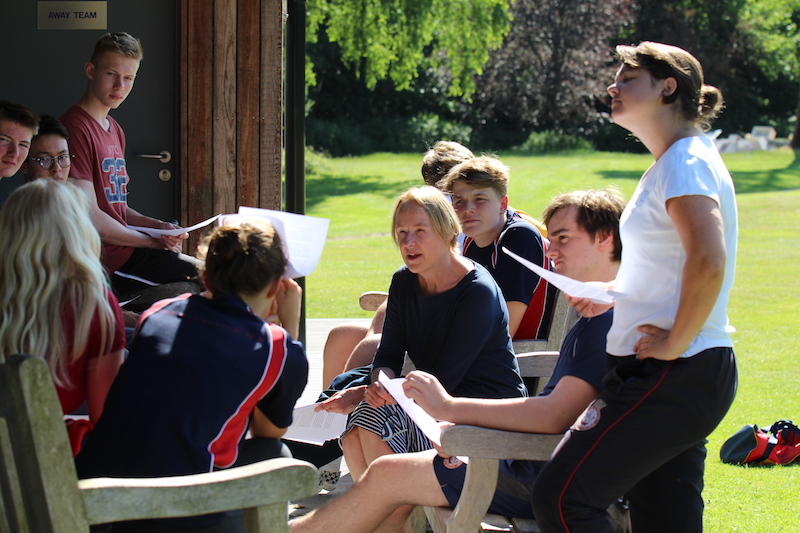Pisa data shows critical importance of pupil well-being initiatives
Posted on 19th May 2020 in School News, Which London School?, Wellbeing
Caroline Bond, Deputy Head Pastoral at Pangbourne College, describes a drive to create a positive and open environment for students and staff...
A report published in 2019 by the OECD’s programme for international student assessment (Pisa) made some revealing discoveries regarding the contrasts between academic performance and personal satisfaction and well-being amongst UK pupils. This is possibly even more important now, with remote learning happening across the country, and questions arising about the impact of lockdown on teenage mental health.
The findings were obtained by testing 15-year-olds on reading, maths, science, and a range of attitudes. The UK produced a generally positive set of results academically, but recorded the biggest declines in “life satisfaction” since the last survey in 2015, with barely half of the subjects reporting they were satisfied with their lives.
One of the main implications of this is the assertion that not enough is being done in the UK for the mental health and well-being of our young people, particularly within our schools. The academic development of pupils will always be a priority, but helping them develop into well-rounded, confident adults with strong values should have equal emphasis. Only in addressing this balance will we be able to contribute to their fulfilment, academically, personally and socially.
Delivering a high level of personalised pastoral care is vital, particularly in these rapidly changing times. Our young people are growing up in a world where many are feeling under an increasing amount of pressure – exams, body image, and the influence of their peers to name but a few – whilst at the same time being bombarded by an increasingly online culture with messages about perfection and great uncertainty about their adult futures. Amid this confusing and often shifting backdrop, it is important that we instil a real sense of individual self-worth within our students, as well as fostering a life-long commitment to look after their own emotional well-being.
A comprehensive and diverse wellbeing programme is hugely important in doing this, and at Pangbourne we have seen the positive influence of using a wide range of speakers, technology and support systems to best support our pupils.
For example, our external speaker schedule addresses many of the most prevalent issues for young people in our society. Themes have included bullying (both online and in real life), substance abuse, pornography and navigating the ‘party scene’ as a teenager – all sensitive issues but ones which require meaningful discussion and education.
Additionally, the commitment of our own staff to pastoral care on a number of initiatives is incredibly valuable. Over fifty members of staff – one-third of both teaching and support staff – successfully completed a course delivered by the National Skills Academy, Understanding Mental Health within Children and Young People, leading to a nationally recognised Level 2 qualification. This has not only increased the depth of understanding of the mental health issues young people may face, but has equipped a large number of staff to support students through difficult times they may face.
We have also introduced the AS (Affective Social) Tracking system across the College. The system provides an innovative means of tracking pupil behaviours, highlighting pastoral concerns as early as possible, allowing staff to support individuals early and in the best way possible. It is done by measuring pupils’ cognitive biases and detecting well-being risks. Research has shown that this data-driven approach can provide a consistently reliable method to reinforce a school’s pastoral systems which are already in place. During the period of lockdown, this has also been made available for College staff in order to make sure staff are able to monitor their own wellbeing.
Encouraging discussion and raising awareness around key issues helps to develop an increasingly positive and open environment for students and staff, as do the values which are promoted throughout a school. At Pangbourne, values are paramount to us and our community. Our Flag Values of kindness, selflessness, moral courage, industry, initiative, resilience and integrity are the foundation upon which our school life is built. They are ingrained in everything we do, contributing significantly to the character development of our pupils and to their education in the broadest possible sense.
The Flag Values also lend themselves well to our thriving Peer Mentoring scheme. Last year we successfully trained fifty members of the Lower Sixth – 75% of the year group – as Peer Mentors, and they are now able to support our younger students. We have built upon the success of the Peer Mentoring scheme and trained a number of students as ‘Digital Champions’. This has not only helped us as teachers keep up-to-date with the latest digital trends and innovations which are influencing the student body, but has also provided an extra layer of pastoral support and advice for the younger pupils here. Since the College moved to remote learning, Peer Mentors have been available online for small group and individual chats with younger pupils.
The trends highlighted by the Pisa results are worrying, but reflective of a host of issues we have seen in wider society. By addressing these issues head-on, we have sparked discussion, changed attitudes, and most importantly, helped some of those who are affected. It is evident from this research that all schools should be encouraging positive mental health and well-being. As ‘whole-child’ educators we have an opportunity to improve the situation, and it is imperative we take that opportunity.
This article first appeared in the 2020/21 edition of Which London School? & the South-East, which you can view in full here: